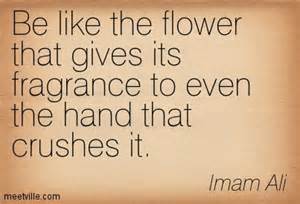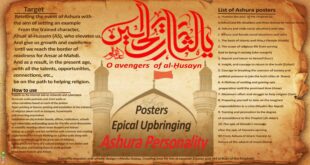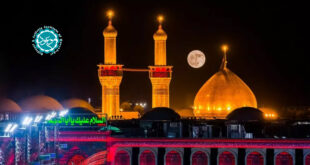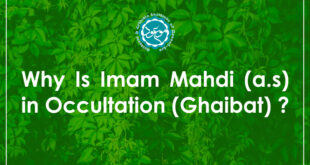Abu-Bakr al-Naqqash has reported Imam Ali as saying:
One day, a Jew came to me saying, “In your book, there is a verse the meaning of which is difficult to understand. If you clarify it for me, I will become Muslim.” “Which verse is that?” I asked. The Jew said, “The verse is: keep us on the right path. If you are already on the right path, why are you asking for it?” I said, “A group of prophets and God’s friends have already entered Paradise and attained an eternal prosperity. We are asking Allah to keep us on that path which led them to Paradise.” The Jew was convinced and he converted to Islam. (Abul Fadhl Meybody, Kashf al-Asrar: 18/1)
One day, Imam Ali (a.s) came home to find Hasan and Husayn crying. He asked for the reason. Lady Fatimah (a.s.) said, “They have not eaten for a whole day.” A pot was boiling on fire at the same time. Imam Ali (a.s) asked,“What is in the pot?” Lady Fatimah (a.s) answered, “There is plain water only.”Imam Ali (a.s) became so distressed that he took his cloak to the market and sold it for six Dirhams. He had no sooner bought something for eating than he met a beggar shouting, “Whoever offers to Allah a good gift, he will have a better one for himself. Imam Ali (a.s) offered to him whatever he had and, when he came back home, he told the story to Lady Fatimah (a.s). She said, “Allah bless you, O Abul-Hasan! You are always benevolent!”
Imam Ali (a.s) was set to go to the mosque to offer prayer when he saw a nomadic selling a camel. He said, “O Abul-Hasan, I am selling this camel. Would you like to buy it?” Imam Ali (a.s) said, “I do not have money.” The nomadic said, “I sell it to you until booty comes or you get something from the public fund.” Imam Ali (a.s) bought that camel for sixty Dirhams and went his way. Another nomadic came to him, “O Ali! Will you sell this camel to me?” Imam Ali (a.s) said, “Yes, I will.” “How much do you sell it for?” asked the man. Imam Ali (a.s) said, “Whatever price you say.” He said, “A hundred and twenty Dirhams.” Imam Ali (a.s) said, “I do.” He then returned home. Telling the story to Lady Fatimah (a.s) he said, “I will give sixty Dirhams to the nomadic and take the other sixty for ourselves.”
So he went out to look for the man. On his way, he met the Holy Prophet who asked, “Where are you going?” Imam Ali (a.s.) told him the story. The Holy Prophet rejoiced, greeted and gave him good news, “O Ali! That man was not an Arab. The first man who sold you the camel was Archangel Gabriel and the second man who bought it was Archangel Michael. The camel too was one of the camels of Paradise. This is the good gift you offered to Allah by helping that beggar. Allah, may He be honored and glorified, has said:
Who is it that will offer to Allah a goodly gift (2:245) [Abul Fadhl Meybody, Kashf al-Asrar, 662/1]As for those who spend their property by night and by day, secretly and openly… (2:274)
This verse was revealed on the occasion that Imam Ali (a.s.) had four Dirhams and in his house there was no one but him. He gave away all four Dirhams to beggars, one by night, one by day, one secretly and one openly.
The members of the Mubahalah (mutual curse) were five: the Holy Prophet, Lady Fatimah, Imam Ali, Imam Hasan and Imam Husayn. The Holy Prophet put his mantle upon them saying,
“O Allah, these are my Household.”
At this moment, Archangel Gabriel came and said, “O Muhammad! am I from your Household?” The Holy Prophet said, “You are from us.” Taking pride in this, Archangel Gabriel said,
“Who can be like me while I am the chief of angels in heavens and a member of Muhammad’s Household?” (Abul Fadhl Meybody, Kashf al-Asrar: 151/2)
Ali al-Murtadha (the well-pleased) – cousin of Muhammad al-Mustafa (the well-chosen Prophet) and spouse of the Lady of the Judgment Day, Fatimah al-Zahra (the luminous lady) who was the guard of caliphate and the head of Allah’s favorites – was the peer of ismah and Prophethood, the source of knowledge and wisdom. Devotion, truthfulness, certainty, trust in Allah, piety and abstinence were his motto and garment. He was the impetuous lion, the holder of Dhul-Fiqar (the lethal sword), and the master of the Muhajirun and Ansar.
 Mouood Mouood English Edition
Mouood Mouood English Edition




